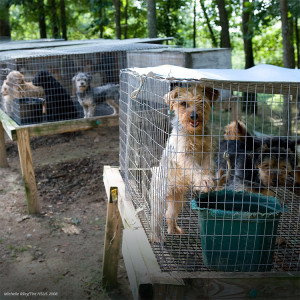Is the American Kennel Club Fighting Against Protective Legislation for Dogs?
The Humane Society of the United States claims the AKC is working to oppose the passage of bills aimed to prevent animal cruelty.

Share Article
The state of federal animal-welfare-protection legislation in the United States is pretty bleak. For decades, this country has pretty much been operating off one piece of legislation — the Animal Welfare Act opens in a new tab(AWA), which was signed into law in 1966 — and many animal advocates consider those standards to be truly minimal. The good news is, congress is considering three bipartisan bills that would amend the AWA, but they are not without their own fair share of controversy.
The AWA sets minimum standards regarding the “handling, care, treatment and transportation” of animals bred for commercial sale, as well as for those used in research and transported commercially or exhibited to the public. Critics of the AWA claim that its provisions for protecting animals, particularly commercially bred dogs, are woefully inadequateopens in a new tab. For example, according to The American Society for the Prevention of Cruelty to Animals (ASPCA), U.S. Department of Agriculture (USDA)-licensed puppy breeders can “legally keep dogs in small wire-floored cages stacked on top of one another for their entire lives” and force female dogs “to breed during every heat cycle, with no opportunities for their bodies to recover.”

Get (totally free) deals for food, treats, accessories, tech, and way more pet parenting must-haves.
opens in a new tabEven these inadequate protections, however, are rarely enforced by the USDA, the federal agency responsible for enforcing them. A 2024 ASPCA report opens in a new tabanalyzed the USDA’s inspections of AWA-licensed facilities and found that federal inspectors documented over 1,000 violations for commercial dog dealers at more than 400 facilities. But per the report, the agency only took action against four dog dealers.
The first bill that would amend the AWA is called HR 1624opens in a new tab — also known as the “Puppy Protection Act” — and is sponsored by Rep. Brian Fitzpatrick (R-PA), who introduced it to the United States House of Representatives in March 2023. It would expand the AWA’s requirements for how commercial dog dealers can handle, care for, treat, and transport animals. It would also mandate that they provide adequate housing, exercise, and veterinary care and continuous access to potable water, among other basic, humane standards.
The Better Collaboration, Accountability, and Regulatory Enforcement (CARE) for Animals Act — also known as the “ Better CARE Actopens in a new tab ” and introduced to the House in September 2023 — aims to “expand and improve the enforcement capabilities of the Attorney General.” Additionally, Goldie’s Actopens in a new tab (introduced March 2023, reintroduced January 2025) “ expands enforcement provisionsopens in a new tab” under the AWA, specifically directing the USDA to “document and record detailed descriptions of the act observed during inspections and investigations.”
The Humane Society of the United States (HSUS) claims opens in a new tab the American Kennel Clubopens in a new tab (AKC) is actively working to oppose the passage of these bills.
Where, exactly, does the controversy lie?
In September, Kitty Block, president and CEO of the Humane Society of the United States (HSUS), wrote that opens in a new tabAKC representatives were “out in force on Capitol Hill, actively fighting stronger animal protections and enforcement that would stem from the passage of the Better Collaboration, Accountability, and Regulatory Enforcement (CARE) for Animals Act and the Puppy Protection Act.”
Sheila Goffe, Vice President of Government Relations at the AKC, tells Kinship that there is more nuance to the AKC’s opposition to this legislation than the HSUS suggests. The AKC doesn’t oppose the proposed legislation in its entirety, she says. Rather, it specifically opposes “one-size-fits-all” language in the legislation that “does not allow for optimal outcomes for the broad range of breeds and dogs.” Instead, it proposes “arbitrary, ‘feel-good’ requirements that are not fully vetted by the scientific community or allow for best practices based on the needs of individual animals and circumstances.”
Take the Puppy Protection Act, which calls for temperature controlopens in a new tab that “is appropriate for age, breed, and condition of the dogs in the enclosure” and “is between 45 and 85 degrees Fahrenheit, when dogs are present in the enclosure.” According to Goffe, this is an example of the “one-size-fits-all legislation” that the AKC is against. Mandating a specific temperature, even a range of between 45 and 85 degrees, can be a problem, Goffe says. Because, “dogs that hunt, sled, detect explosives, or do other work and thrive in cooler temperatures, or that must be acclimated to cooler or warmer temperatures for their safety” are not accounted for in this range.
John Goodwin, senior director of the HSUS’s campaign to Stop Puppy Mills, disagrees. “Could they name one breed that would be negatively affected by living in the temperature requirements that we spell out in that bill?” he asks Kinship.
Per Goffe, other language in the Puppy Protection Act that the AKC takes issue with includes language that prohibits the breeding of female dogs “unless pre-screened by a veterinarian.” The AKC has a problem with this because “no specific details are provided on what the screening would involve or who would make these decisions.”
Goodwin counters: “The AKC’s view that the law should be something other than one-size-fits-all would describe a regulatory nightmare. The fact is that there needs to be one standard that works for all dogs and gives the best life for all dogs and that everyone follows.” Goodwin also asks: Why oppose the bill altogether? Why not approach the bill’s sponsor, and ask them to change specific language they are unhappy with and move forward with the bill as a whole?
Goffe tells Kinship that “it’s pretty rare for us to go out and say, ‘We oppose a specific piece of legislation.’” But rather, the AKC opposes “a piece of” the whole, “and our policy is to try to amend or change that piece of it.” Goffe states that the AKC has “spoken with many lawmakers and/or their staff about our concerns and alternatives,” including Reps. Fitzpatrick and Reschenthaler, sponsors of the Puppy Protection Act, and Sens. Richard Blumenthal (D-CT) and John Neely Kennedy (R-LA), sponsors of the Better CARE Act.
Goodwin acknowledges that he’s aware of a back-and-forth exchange between Congressman Fitzpatrick and the AKC regarding the Puppy Protection Act.
Is the AKC just protecting puppy mills and other breeders?
While they may have engaged in the process of proposing amendments on the federal level, Kathleen Schatzmann, Animal Legal Defense Fund (ALDF) strategic legislative affairs manager, says the AKC hasn’t done so on the state level. She says they have especially haven’t been involved when it comes to legislation that would affect commercial breeders.
“What we’ve experienced certainly at the state level is opposition, full stop, to state retail sales bans in particular,” Schatzmann tells Kinship.
The need to protect large-scale breeders is the core of the issue of AKC’s protestation of animal-protective legislation, according to HSUS and the ALDF. The AKC opposes protective bills, these organizations say, because they maintain language in the AWA that makes it possible for puppy mills to exist with minimal, if any, regulation.
According to the HSUSopens in a new tab, the AKC is motivated to do so because the majority of their funding comes from its dog registrations, a lot of which “is from big players in the puppy mill industry and their pet store sales outlets, including Petland.” Goffe tells Kinship that the AKC is not opposed to legislation that regulates commercial breeders, but that they do oppose legislation that unfairly casts a “big, broad net that catches a lot of small hobby breeders,” in addition to commercial breeders.
In reality, according to the AKC’s own publicly available material,opens in a new tab the legislation requires breeders with five or more “breeding females” who ship puppies to pet stores, brokers who then resell those puppies to pet stores, or breeders who sell puppies on the internet to have a USDA license. Small breeders with more than four “breeding females” who meet the buyers of their puppies face to face are not required to have a USDA license, and are therefore not subject to USDA regulation.
Goffe also insists that the AKC’s legislative goals are “based on our policy position statements, which are developed by our board of directors,” the members of which she says “tend to be folks from competitive sports” rather than breeders. What’s more, according to Goffe, less than 10 percent of breeders who register with the AKC have more than six litters a year, meaning the majority of breeders who register are not “high-volume commercial breeders.”
So, how much of those 10 percent of registered breeders contribute to the AKC’s funding? Brandi Hunter Munden, AKC’s vice president of public relations and communication tells Kinship that they “do not break out our finances according to breeder volume,” and “volume and money are not factors we prioritize when it comes to protecting and advocating for dogs. Any indication otherwise is made to fit a false narrative.”
Goodwin disagrees: “At the end of the day, the AKC’s primary revenue stream is registrations.” Even though the AKC has other revenue streams, such as events,opens in a new tab those events require the dogs who participate to be AKC-registered.opens in a new tab Goodwin says if the AKC doesn’t “have breeders registering with them, then they’re not going to be able to make money off of all of these services they provide.”
The AKC says they want better enforcement of current laws. So, why are they opposing legislation that would do that?
AKC’s 2023 annual report opens in a new tab(the most recent available) backs this up, stating that registrations and event fees accounted for $71.3 million in operating revenue. One thing that both the AKC and organizations like the HSUS and ALDF agree on? Better enforcement of existing animal-protective legislation is necessary.
“Rather than expanding existing laws,” Goffe says. “We really need better enforcement [of existing laws].”
And yet, that’s exactly what bills like the Better CARE for Animals Act and Goldie’s Act aim to do. Goodwin says the Better CARE for Animals Act “would streamline the process for the Department of Justice to help with enforcement when there’s a particularly egregious case” of animal abuse, and yet, “the AKC is just as vigorously lobbying against that as well.”
The Better CARE Act would give the U.S. Department of Justice (DOJ), not just the USDA, authority to get involved with cases of animal abuse. On their website, the AKC states that they oppose this because it “would move oversight authority from an agency staffed by animal experts that focuses on improving animal husbandry” and instead “place it with one with little or no animal expertise that focuses on violations as potential federal crimes.” They also say this could “potentially undermine or remove current exemptions from licensing for small hobby breeders.”
What can you do?
At the end of the day, no matter where organizations like the AKC or the HSUS stand on this legislation, however, there is something you can do: Take a look at the legislation that Congress is currently considering, including the Puppy Protection Actopens in a new tab, the Better CARE for Animals Actopens in a new tab, and Goldie’s Actopens in a new tab. They’re not long or complicated. Actually, they’re pretty straightforward. If you support the requirements they’d like the USDA and DOJ to enforce for commercial breeders or have any concerns, call your congressperson and let them know.
References
“AKC Facts and Stats: Puppy Buying.” American Kennel Club, www.akc.org/press-center/articles-resources/puppy-buyer-fact-sheet/opens in a new tab.
American Kennel Club Annual Report. https://s3.amazonaws.com/cdn-origin-etr.akc.org/wp-content/uploads/2024/12/13044344/Annual-report-2023.pdfopens in a new tab.
“The American Kennel Club Is Actively Obstructing Stronger Protections for Dogs.” The Humane Society of the United States, 18 Sept. 2024, www.humanesociety.org/blog/akc-obstructing-stronger-protections-dogsopens in a new tab.
R-PA-1, Brian K. “Text - H.R.1624 - 118th Congress (2023-2024): Puppy Protection Act of 2023.” Congress.gov, 2023, www.congress.gov/bill/118th-congress/house-bill/1624/text?s=9&r=1&q=%7B%22search%22%3A%5B%22HR1624%22%5D%7Dopens in a new tab. Accessed 29 Jan. 2025.
R-PA-14, Guy. “Text - H.R.5041 - 118th Congress (2023-2024): Better CARE for Animals Act of 2023.” Congress.gov, 2023, www.congress.gov/bill/118th-congress/house-bill/5041/text.
U.S. Department of Agriculture. “Animal Welfare Act.” National Agricultural Library, U.S. Department of Agriculture, 2023, www.nal.usda.gov/animal-health-and-welfare/animal-welfare-actopens in a new tab.
“54 Years Later, the Animal Welfare Act Fails to Protect Animals.” ASPCA, 24 Aug. 2020, www.aspca.org/news/54-years-later-animal-welfare-act-fails-protect-animalsopens in a new tab.

Julie Zeilinger
Julie Zeilinger is a NYC-based writer and editor whose writing has been published in Marie Claire, Vox, HuffPost, Forbes, and other publications. She is also the author of two books: College 101: A Girl’s Guide to Freshman Yearopens in a new tab (2014) and A Little F’d Up: Why Feminism Is Not a Dirty Wordopens in a new tab (2012). She is the mom to Baloo, a two-year-old Bichpoo and foster mom to dogs via Badass Animal Rescueopens in a new tab.
Related articles
![Puppy sad and alone in a cage.]() opens in a new tab
opens in a new tabWhat’s Goldie’s Act? And Why Animal Rights Activists Are Backing It
Named for a Golden Retriever who died a tragic, preventable death, this legislation would protect other animals from meeting the same fate.
![Woman hugs her black poodle dog outside in New York City.]() opens in a new tab
opens in a new tabNew York City Passed Legislation Banning the Sale of Dogs and Cats in Pet Stores
A handful of other cities and states have done the same in an effort to end the puppy mill pipeline.
![Korean K9 rescue volunteers.]() opens in a new tab
opens in a new tabSouth Korea Passes Bill to Ban Their Dog Meat Industry—“This Is History in the Making”
The legislation aims to end the practice by 2027. Here’s what you can do to help right now.
![The Animal Welfare Act is meant to protect over a million animals housed in puppy mills, roadside zoos and research facilities across the U.S.]() opens in a new tab
opens in a new tabCongress Orders the Department of Veteran Affairs to Stop Testing on Cats and Dogs
Under new legislation, all experiments on dogs, cats, and primates must end by 2026.
![Walking dog on a leash in the road.]() opens in a new tab
opens in a new tabProposed NYC Legislation Would Increase Penalties for Pet Hit-and-Runs By Up to 900%
The PAWS Act aims to take pet injuries and deaths more seriously under the law.
![Beagles playfully running free after being rescued from an animal testing facility.]() opens in a new tab
opens in a new tabCalifornia Is the First State to Ban Testing of Chemicals on Cats and Dogs
The U.S. has a long way to go when it comes to ending what Gov. Gavin Newsom calls “cruel and unnecessary testing.”







